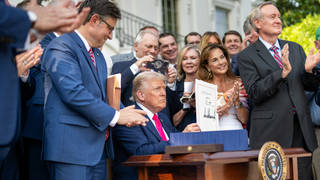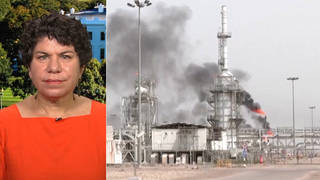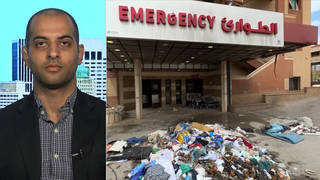
Topics
Guests
- John DearCatholic priest, antiwar activist, author, and former director of the Fellowship of Reconciliation. He was nominated for the Nobel Peace Prize by Archbishop Desmond Tutu.
In memory of Thich Nhat Hanh, the world-renowned Buddhist monk, antiwar activist, poet and teacher who died Saturday, we reair a speech Hanh gave at Riverside Church in New York in 2001. Shortly after the 9/11 attacks on the World Trade Center, Hanh urged the audience to embrace peace in the face of anger, citing his experience of witnessing suffering on both sides during the war in his native Vietnam. “The real enemy of man is not man,” says Hanh. “It is ignorance, discrimination, fear, craving and violence.” We also speak with Hanh’s longtime friend and fellow peace activist, Father John Dear, former director of the Fellowship of Reconciliation, the organization that first brought Thich Nhat Hanh to the United States in the 1960s. “He was really an embodiment of peace and gentleness and nonviolence,” says Dear.
Transcript
AMY GOODMAN: This is Democracy Now! I’m Amy Goodman, with Juan González, as we end today’s show remembering the world-renowned Buddhist monk, antiwar activist, poet and teacher Thich Nhat Hanh. He died Saturday in his native Vietnam at the age of 95.
Thich Nhat Hanh was exiled from Vietnam for decades beginning in the '60s after he spoke out publicly against the war. In 1966, he traveled to the U.S. and met with Dr. Martin Luther King Jr., helping to persuade Dr. King to speak out against the U.S. War in Vietnam. King went on to nominate Thich Nhat Hanh for a Nobel Peace Prize a year later, calling him an “apostle of peace and nonviolence.” In 1969, Thich Nhat Hanh led a Buddhist delegation to the Paris peace talks that resulted in accords between North Vietnam and the United States. He believed Buddhist principles should be applied to everyday life and even to solve difficult political problems. In 2001, on September 25th, two weeks after the 9/11 attacks, Thich Nhat Hanh spoke at the historic Riverside Church here in New York, where Dr. Martin Luther King first spoke out publicly against the Vietnam War. The subject of Thich Nhat Hanh's speech was “Embracing Anger.” This is part of his address that Democracy Now! aired the next day.
THICH NHAT HANH: My dear friends, I would like to tell you how I practice when I get angry. During the War in Vietnam, there was a lot of unjustice — injustice. And many thousands friends of mine, many disciples of mine were killed. I got very angry. One time, I learned that the city of Ben Tre, 300,000 people, was bombarded by American aviation just because some guerrillas came to the city and tried to shoot down American aircrafts. They did not succeed, and after that, they went away. And the city was destroyed. And the military man who was responsible for that declared later that he had to destroy the city of Ben Tre in order to save it.
I was very angry. But at that time, I was already a practitioner, silent practitioner. I did not say anything, I did not act, because I knew that acting or saying things while you are angry isn’t wise. It may create a lot of destruction. I went back to myself, recognizing my anger, embracing it, and looked deeply into the nature of my suffering. …
I was able to understand the nature of the suffering in Vietnam. I saw that not only Vietnamese suffer, but Americans suffered, as well, during the War in Vietnam. The American young men who were sent to Vietnam to kill and to be killed, they underwent a lot of suffering. And the suffering continues even today — their family, the nation. And so, I could see that the cause of our suffering in Vietnam is not the American soldiers. It is a kind of policy that is not wise. It is a misunderstanding, it is fear, that lie at the foundation of the policy.
And many of us in Vietnam have had — had burned themselves in order to call for a cessation of the destruction. We did not want to inflict pain on other people. We wanted to take the pain on ourself in order to get the message across. But the sound of bombs and mortars was too loud. People in the world, not many of them were capable to hear us. So I decided to go to America and call for a cessation of the violence. That was in 1966. And because of that, I was prevented to go home. And I began my exile since that time, 1966.
Because I was able to see that the real enemy of man is not — the real enemy of man is not man. It is ignorance, discrimination, fear, craving and violence. And that is why I did not have hate vis-à-vis the American people, the American nation. So, I came in order to plead for a kind of looking deeply, so that your government could revise that policy. I remember I met with Secretary of Defense Robert McNamara, and I told him the truth about the suffering. He kept me with him for a long time, and he listened deeply to me, and I was very grateful for his quality of listening. And three months later, when the war was intensified, I heard that he resigned from his post. Hatred and anger was not in my heart. That is why I was listened to by many young people in my country, advocating them to follow the path of reconciliation. And together, we have helped bring about the negotiations for peace in Paris.
I hope my friends here in New York are able to practice the same. I understood, I understand suffering and injustice. And I feel that I understand deeply the suffering of New York, of America. I feel I am a New Yorker. I feel I am an American. We want to be there for you, to plead with you not to act, not to say things when you are not calm. There are ways that we can go back to ourselves and practice so that we rediscover our calmness, our tranquility, our lucidity. There are ways by which we can look deeply to understand the real causes of the suffering. And that understanding will help us to do what needs to be done and not to do what could be harmful to us and to other people. …
And if we can listen to each other, we can also listen to the people outside of the country. Many of them are in a situation of despair. Many suffer because of injustice and discrimination. The amount of violence and despair in them is very huge. And if we’d know how to listen as a nation to their suffering, we can already bring a lot of relief. They feel that they are being understood. That can defuse the bomb already.
AMY GOODMAN: World-renowned Buddhist monk, antiwar activist, poet and teacher Thich Nhat Hanh, speaking just two weeks after the September 11th attacks right here in New York at Riverside Church. Thich Nhat Hanh died Saturday at the age of 95.
For more, we are joined by his longtime friend and fellow peace activist, Father John Dear, former director of the Fellowship of Reconciliation, the group that first brought Thich Nhat Hanh to the United States in the 1960s.
Father Dear, welcome back to Democracy Now! That was when he met with Dr. Martin Luther King, influenced him to write the speech against the War in Vietnam, and then King nominated Thich Nhat Hanh for a Nobel Peace Prize. Talk about your relationship.
FR. JOHN DEAR: Thank you so much, Amy. And thank you for playing that beautiful clip.
So, I knew Thay because of my friendship with Daniel Berrigan and because I was the director of Fellowship of Reconciliation, but I had been in contact with him in the late ’80s and early ’90s. Remember, Amy, the Fellowship of Reconciliation is the group that brought him to the United States in 1966. And our friend John Heidbrink was the genius who set this up. His idea was: Nobody knew who Thich Nhat Hanh was; I need to bring, introduce this unknown Vietnamese monk to the three most important religious leaders in the United States — Martin Luther King, Thomas Merton and Daniel Berrigan. And that was brilliant. And each of them were changed by Thich Nhat Hanh. Dr. King said he had never met anybody like him, and same with Thomas Merton. And then Daniel Berrigan became very close with him. And after Dan got out of prison, moved to Paris and lived with him in 1974 and ’75.
And so, I met him. I spent a day with him when I became the executive director of the Fellowship of Reconciliation in the late ’90s, and knew him up ’til — actually, spent a day with him shortly before his massive stroke in 2016 in Plum Village. So I got to know him personally and talk about all these things, our friends, especially Daniel Berrigan, peace movement, nonviolence. He was always challenging me and criticizing me, but, wow, he was really an embodiment of peace and gentleness and nonviolence.
He practiced what he preached. And his message to me and the peace movement in the United States was: Be the peace you want to seek. He had that sentence, “To practice nonviolence, you have to become nonviolence.” And he did that. So, all his teachings about engaged Buddhism and mindfulness and living in the present moment of peace and being as nonviolent as you can to yourself and everyone, and part of the engagement in the world, as you saw in that speech, of disarming the world, he said — and really important to activists who care about justice and disarmament and creation — we more than all have to be on our game and totally centered in peace 24/7. And it was a great pleasure and joy to know the great man. I had a feeling, every time I was with him, it was like being with Gandhi. You know, he was so peaceful.
AMY GOODMAN: Well, Father Dear, we’re going to do a Part 2 with you, talking about the life of Thich Nhat Hanh. You were also a dear friend of Archbishop Desmond Tutu, who we also lost in the last weeks, and we’ll talk about him, as well. Father John Dear, longtime peace activist, Catholic priest, executive director of the Beatitudes Center, now in Big Sur, California.
That does it for our show. Democracy Now! produced with Renée Feltz, Mike Burke, Deena Guzder, Messiah Rhodes, Nermeen Shaikh, María Taracena, Tami Woronoff, Charina Nadura. Special thanks to Julie Crosby. I’m Amy Goodman, with Juan González.












Media Options